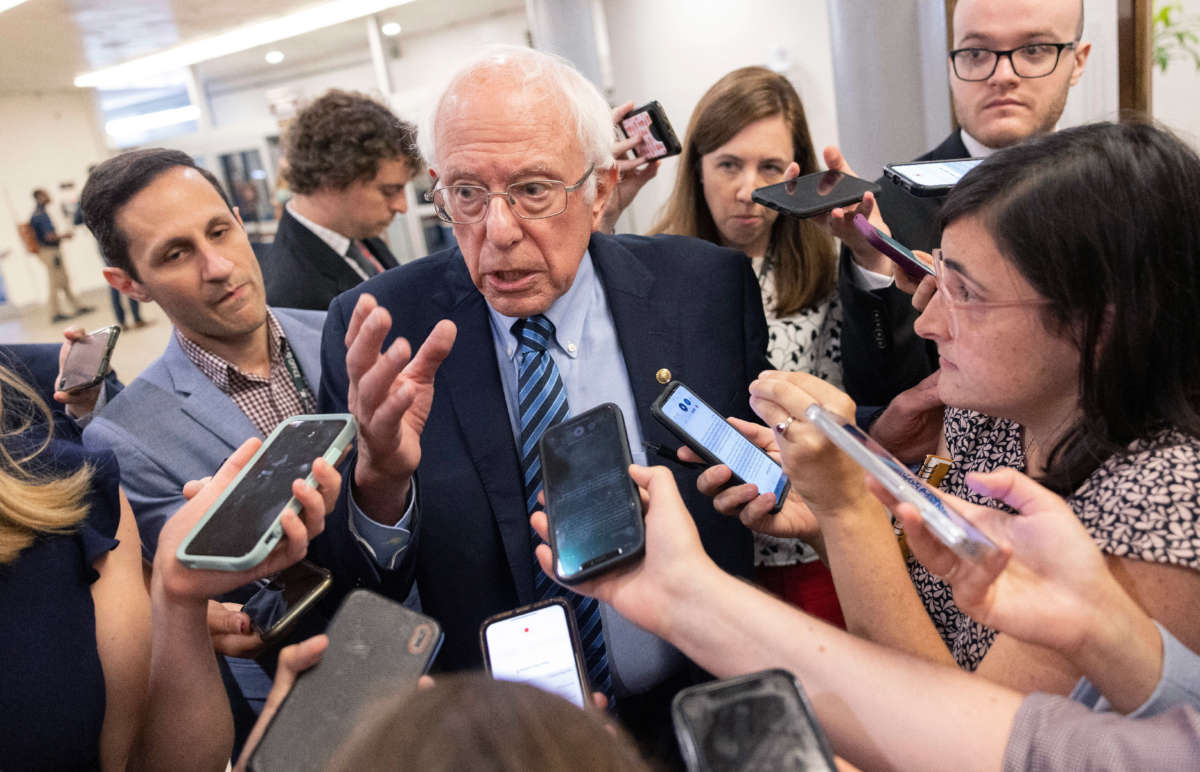When the idea of the reconciliation bill was originally floated in June, Sen. Bernie Sanders (I-Vermont) had an ambitious price tag in mind: $6 trillion. And, though the reconciliation bill currently in discussion is $3.5 trillion, senators say that the bill isn’t smaller because of Sanders.
Though it’s yet unclear what exactly is in the reconciliation bill, lawmakers like Sanders and Majority Leader Sen. Chuck Schumer (D-New York) have celebrated it, saying it would be the largest and most consequential measure if it passes Congress.
The full bill has yet to be unveiled. But it contains some significant Democratic benchmarks like Medicare expansion, major climate provisions, tax hikes on the wealthy and parts of the pro-union PRO Act, which has been hailed by labor advocates as crucial legislation to protect the working class.
It’s thanks to Sanders that Democrats have been able to include as many of their agendas items as they have, senators say. Senators on the Budget Committee told Politico recently that they see the committee chair’s $6 trillion benchmark as a negotiation tactic and that, if he had originally proposed a smaller bill, the Democrats would be looking at a much smaller price tag than $3.5 trillion.
“Bernie Sanders is like a human embodiment of shifting the Overton Window,” Sen. Tim Kaine (D-Virginia), who is on the Budget Committee, told Politico. “We wouldn’t be there without him putting out $6 trillion.”
Though Sanders had originally rejected a smaller price tag than the $6 trillion of his proposal, he has said that $3.5 trillion is still enough to fit everything he wanted to get passed — though for a shorter period of time than he would like. That means that there could still be future fights over renewing some of the proposals in the bill, writes Politico.
Over the past months, Sanders has been exercising a much stronger influence over the White House and Washington at large than he previously has. He has a close relationship with the White House and President Joe Biden, who is receptive and supportive of Sanders’s ideas.
Last week, the two had an extended meeting in which Sanders discussed the need for Biden to go bigger on his infrastructure bill. Biden’s original infrastructure proposal was $4 trillion — Sanders argued for his $6 trillion proposal, which the president was open to. The two also talked about uniting the party in support of the reconciliation bill.
Though Biden’s support doesn’t always lead to results (Sanders talked to the White House constantly during the $15 federal minimum wage fight earlier this year to no avail), it signals an openness from Democratic leadership to progressive ideals. It also signals a shift from Sanders being a political outsider to being a dealmaker within the Democratic caucus.
The largest hurdle for Democrats to cross now on the reconciliation package is the conservative plank of the party. Winning the approval of people like Sen. Joe Manchin (D-West Virginia) may prove difficult; and there’s already a fight brewing within the party over proposals to allow Medicare to negotiate drug prices.
Schumer is evidently prepared to move on with both the reconciliation and bipartisan infrastructure bills, however. The majority leader is expected to file cloture on the infrastructure bill on Monday, setting up a procedural vote on the matter later this week. The bipartisan group is still negotiating specifics of the bill — evidently, there’s still debate about something in every spending category. Meanwhile, Schumer is also preparing to get all 50 Democrats on board with the reconciliation bill by the end of this week.
Our most important fundraising appeal of the year
December is the most critical time of year for Truthout, because our nonprofit news is funded almost entirely by individual donations from readers like you. So before you navigate away, we ask that you take just a second to support Truthout with a tax-deductible donation.
This year is a little different. We are up against a far-reaching, wide-scale attack on press freedom coming from the Trump administration. 2025 was a year of frightening censorship, news industry corporate consolidation, and worsening financial conditions for progressive nonprofits across the board.
We can only resist Trump’s agenda by cultivating a strong base of support. The right-wing mediasphere is funded comfortably by billionaire owners and venture capitalist philanthropists. At Truthout, we have you.
We’ve set an ambitious target for our year-end campaign — a goal of $230,000 to keep up our fight against authoritarianism in 2026. Please take a meaningful action in this fight: make a one-time or monthly donation to Truthout before December 31. If you have the means, please dig deep.
